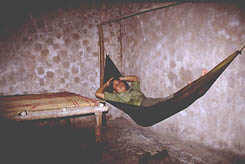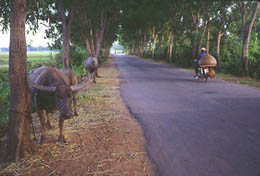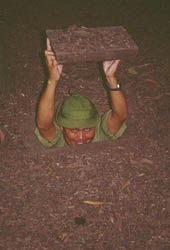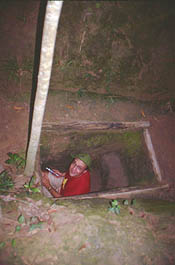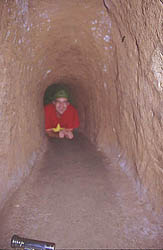(continued) |
|
|
After spending five five days in an urban setting Bill decided to head out into the countryside surrounding Ho Chi.Minh City. He hired a motorcycle and driver for about $8 and was taken to the famous Cu Chi tunnels where the Viet Cong (South Vietnamese rebels fighting against the Saigon government and the U.S.) and their supporters were forced to hide and live for long periods of time. These tunnels, although within South Vietnam and in area supposedly controlled by the United States military, were rarely ever discovered. According to Bill, "They are all honeycombed around Saigon. There's actually over 400 kilometers of these tunnels, virtually surrounding Ho Chi Minh City in an |
| area called the Iron Triangle of Vietnam which was heavily pro Viet Cong. They were dug by hand by the Viet Cong and their supporters. They were absolutely remarkable. They were imperceptible to the eye. The U.S. could virtually never find them. My guide, who was a communist, showed me the area and asked me where the tunnel was. And I looked and looked and absolutely couldn't find | |
|
it. And then he brushed away some leaves and there it was. The entrance was so tiny, [but] he could get through and I could barely get a leg in the entrance." This, of course was deliberate on the part of the Viet Cong and, even if a tunnel entrance were found, it was unlikely that any westerner with his massive physique would get very far. Bill is seen in the photo to the right entering the specially dug tunnel for westerners. Bill and his guide went down about 15 yards beneath the earth, crawling on their bellies, Bill with a flashlight clutched in his mouth. The tunnels were usually equipped to support a contingent of soldiers for at least one month and included an operating room, barracks, |
|
and cooking facilities. The kitchens would be equipped with bamboo poles that would eject the smoke in very small puffs that would exit the underground at a sufficient distance away to avoid giving away the tunnel's location. Bill did mention though that the U.S. in its fervor to discover these tunnels came up with many new and ingenious ways to kill. One such masterpiece of technology was |
|
called the drilling bomb. It would drill itself
into the ground and explode upon sensing oxygen. Bill also visited similar tunnels in the north. However, these tunnels were used to protect the civilian population from the constant bombardment by American B52s in an air war that unleashed more tonnage of bombs on this small country than dropped in all of World War 2. |
Click here for more photos from the Cu Chi Area
Back to Chapter 1-Trip Narrative
To Chapter 3 -Trip Narrative
